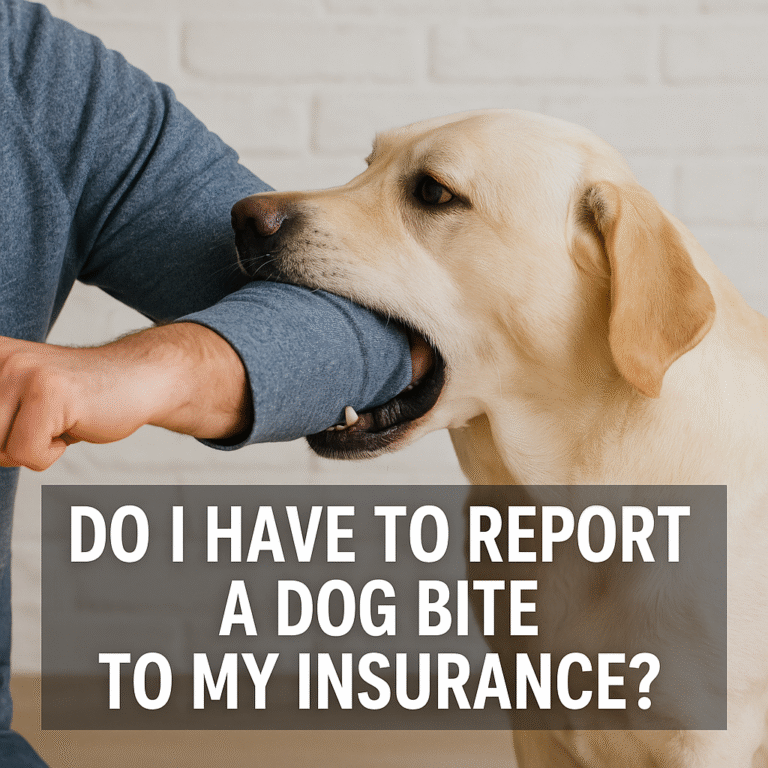Dog bites can be frightening, painful, and unexpected. Whether you’re a pet owner or someone who’s been bitten, knowing how to handle the aftermath is crucial. One of the most important questions people ask is: do I have to report a dog bite to my insurance? The answer can affect your financial security, legal responsibilities, and peace of mind.
Understanding the Legal Duty to Report a Dog Bite
In most states, if your dog bites someone—even if it’s minor—you are legally required to report the incident. Many local governments mandate reporting to animal control or local health departments, and your insurance provider needs to know too. Timely reporting can shield you from liability, especially if the bite leads to a lawsuit or medical costs.
What Happens If You Don’t Report a Dog Bite?
Failing to report a dog bite can have serious consequences. Insurance companies may deny any future claims related to the incident. The victim could also sue you for damages. Not reporting may violate local laws, potentially resulting in fines or other legal penalties. You may also lose trust with your insurance company, impacting future claims.
Does Homeowner’s or Renter’s Insurance Cover Dog Bites?
Yes, most homeowner’s and renter’s insurance policies include personal liability coverage that typically pays for dog bite-related medical bills, legal fees, and settlement costs. However, certain aggressive dog breeds might be excluded, and coverage limits vary. Always check your policy details. If your dog is excluded, consider an umbrella policy for added protection.
Should You Report a Dog Bite Even If It’s Minor?
Absolutely. Even a small bite can lead to medical complications or a legal dispute down the road. Reporting ensures everything is on record, safeguarding you if the situation escalates. It also demonstrates responsible pet ownership, which insurance companies and authorities appreciate.
How to Report a Dog Bite to Your Insurance Provider
Reporting a dog bite is simple but requires attention to detail. Start by documenting the incident: take photos, collect witness statements, and note the date, time, and location. Then, contact your insurance company’s claims department. Provide them with all the evidence, and follow up in writing. This official documentation will help protect your interests.
Who Else Should You Report a Dog Bite To?
Besides your insurer, report the incident to local animal control, especially if the bite occurred off your property. This helps track potentially dangerous animals and ensures public health. In some cases, medical professionals are also required to report dog bites. Full disclosure creates a transparent record that can work in your favor.
Does Reporting a Dog Bite Increase Your Premium?
It might. Insurance companies evaluate risk when setting your premium. A dog bite claim can increase your rates, especially if your dog is considered high-risk. However, failing to report could result in far worse consequences, such as total claim denial or legal liabilities. Responsible reporting shows you take liability seriously.
Legal and Financial Consequences of Not Reporting
If a dog bite leads to a lawsuit and you never reported it, your insurer may decline to defend or cover costs. That means you could pay for medical bills, attorney fees, and settlement costs out of pocket. Additionally, municipalities can impose fines or even order your dog to be removed. Reporting is both a legal safeguard and a financial safety net.
Best Practices for Dog Owners to Avoid Future Incidents
Avoiding dog bites begins with responsible pet ownership. Train your dog, socialize it early, and use leashes or fences to secure your pet. Regular vet visits help detect health issues that could cause aggression. Consider an umbrella liability policy for added coverage, especially if your breed is excluded from standard insurance. Being proactive not only protects others but also builds trust with your insurer.
Conclusion
Dog bites are serious, but you can handle them responsibly. Yes, you should always report a dog bite to your insurance. Doing so helps you meet legal requirements, ensures medical and legal coverage, and builds credibility with your provider. With the right approach, you can protect yourself, your pet, and your future.
By the way, if you’re also curious about broader coverage concerns, check out topics like does gap insurance cover mechanical failure and does car insurance cover storm damage to ensure you’re fully protected in every situation.
FAQs About Do I Have to Report a Dog Bite to My Insurance
Do I legally have to report a dog bite to my insurance?
Yes. In most states, if your dog bites someone, reporting it to your insurance provider is highly recommended. It may even be required to maintain your coverage.
Will my homeowner’s insurance cover a dog bite?
Typically, yes. Homeowner’s insurance often includes personal liability that covers dog bites. However, check for breed restrictions or policy exclusions.
Can I get in legal trouble for not reporting a dog bite?
Definitely. You could face lawsuits, denied claims, or even local penalties. Reporting is a legal safeguard that protects your rights.
What if my dog bit someone at home — do I still need to report it?
Yes. Location doesn’t affect liability. Whether it happens inside or outside your property, you should report the incident.
How soon should I report a dog bite to my insurer?
Immediately. Most insurers expect you to report within 24 to 72 hours. Prompt action helps ensure coverage.
